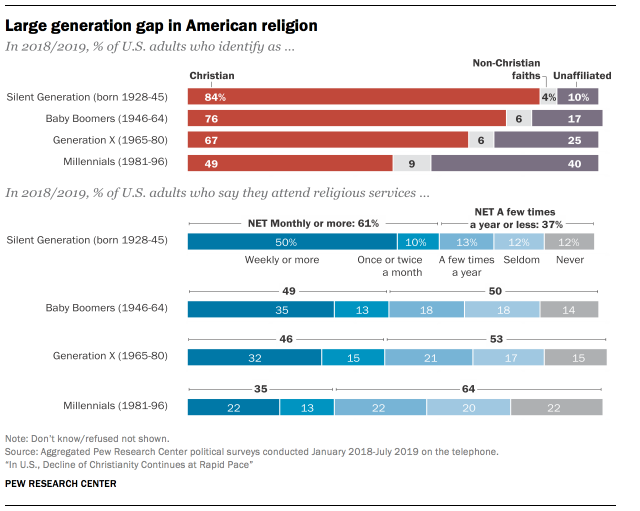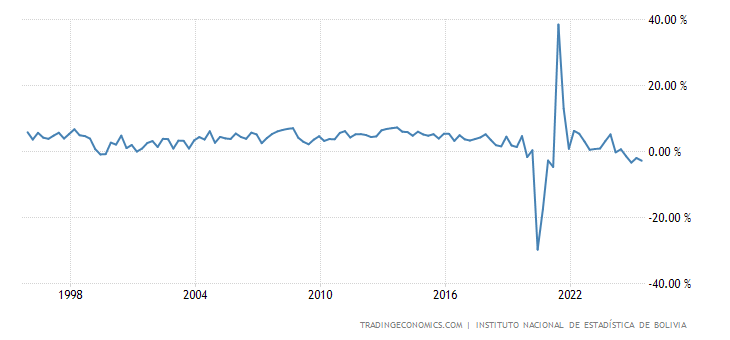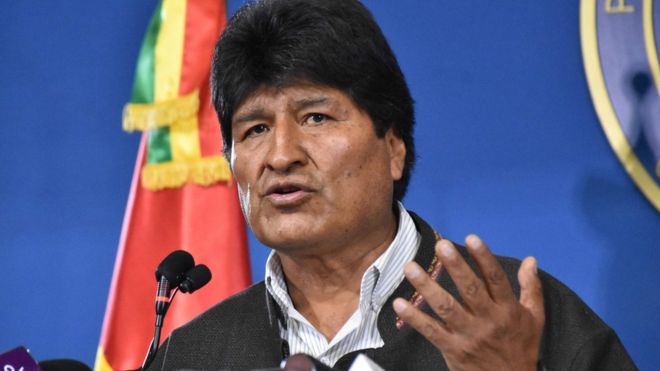The biggest takeaway from all this latest data? Millennials (yeah, those slackers, despite adults calling the younger generation slackers as far back as Aristotle) are a LOT less religious than their parents. A LOT less.
"Nones," the common word for those with no religious affiliation or identity, plus non-Christians, have as great an identity among Millennials as all Christian groups combined. No, really.
Now, this is a lot broader group than atheists or agnostics, despite Gnu Atheists talk of an "atheist surge," which has been going on for a decade or more now. (The talk, not any surge.) That said, self-identified atheists and agnostics have more than doubled over the 12-year range of the data, from 4 percent in 2007 to 9 percent in 2019.
It should be noted that "nones" may well have metaphysical beliefs. That's another reason for Gnus to stop poaching and crowing. Looking back 15 years or so, a woman on Match.com who originally wanted to meet me said "no" when she found out that "atheist" meant just that and NOT "spiritual but not religious" or Wiccan light or whatever. (It should also be noted, which Gnus don't, that millions of Buddhists around the world, mainly in the Theravada tradition, are both atheist and religious — and believe in metaphysical ideas, just not a personal god.)
That said, Nones are voting with their feet, not just their brains. In 2014, people who attend religious services just a few times a year first exceeded those who worship monthly or more. Among Millennials, it's just one-third who go to services once a month or more.
Among Americans overall, that growth is driven by a surge in those who NEVER attend, by self reporting. That's up to 17 percent.
Yes, one-sixth of Americans, even if they have some metaphysical beliefs (astrology, luck, Kabbalah or whatever) lurking somewhere, say they NEVER attend religious services. Related? Among those who say they attend once a month or more, the most ardent, the weekly attenders (or more) lost six percentage points, down to 31 percent. (If even that is correct; time and motion studies have shown that decades-old self-reported religious attendance surveys were consistently too high.)
Pew notes that the National Opinion Research Center, with different questions and framing, shows a similar number of Nones. It's at 22 percent for all ages vs 26 percent from Pew, even with somewhat different framing and questioning.
Will this "stick"? My answer is that it will, at least to some degree. More slowly, America is becoming less religious, like Europe after WWII. (Before then, and certainly before the Depression, Europe and America didn't track that differently.
It's probably kind of like cigarette smoking. If the Nones who truly don't go to church at all continue that through age 30, they'll likely never be there. And, with that, contra the fakery of Supreme Court backtracking in rulings like Town of Greece, at some point, the First Amendment's freedom of religion meaning true freedom from government propping up religion in any way will maybe start to be realized. Beyond totally banning pre-meetings prayers, etc., I'm talking about things like churches not getting any tax breaks beyond those extended to nonprofit entities in general and things like that.
Even in places like smaller towns in Texas, if they're anywhere closer to the East Texas metros, in 20 years, if not less, less vocal Nones will realize they're not alone. And they're going to start challenging the city council, the school board and the commissioners court about opening meetings with invocations. And, if Democratic (or Green? Socialist? even Libertarian?) presidents are listening, they'll be appointing judges who know that "freedom of religion" includes that the government can do NOTHING in terms of an establishment of religion — any religion as no specific religion is mentioned — that the First Amendment is the most federalized one in the constitution, and that the mealy-mouthed Town of Greece ruling is wrong.
Democrats who don't recognize this are going to find that "non-Republican votes" aren't necessarily "Democratic votes."
BRING.IT.ON.
==
Update, with some related stats? In 2019, 23 percent of Americans went to church every week. Sounds fairly devoted, right, every week? But 29 percent never went once. Texas, Bible Belt stereotypes aside, is no exception. This site says that it was less than 20 percent, and they're a religious website.







